
Michele Dominique Raymond is a political strategist and an expert in policy advice & international relations. During her chequered career of over 25 years – Michele has overseen and implemented cooperation agreements for economic development, humanitarian assistance, and project planning. She has co-designed, formulated, launched, and led several high-level political conferences, programs, and negotiations, mostly in the context of diplomatic and economic cooperation with the European Union (EU).
Michele provides sought-after leadership in matters of human development, women empowerment, and culture. She creates viable and sustainable pathways for funding and compliance for NGOs, private firms, and public constituencies. She is passionate about fostering collaboration and dialogue among diverse stakeholders and advancing global peace and security.
Michele holds a Master of Arts in International Relations and Affairs from the Université libre de Bruxelles and a degree in Clinical and Pathological Psychology from the Sorbonne.
Praveen Gupta (PG). You have a degree in Clinical and Pathological Psychology from the Sorbonne. Would you please talk me through what this subject is about? Were there many women studying this when you were a student?
Michele Dominique Raymond (MDR): As far back as I can remember, I have always wanted to become a psychologist. Thus, after completing a bachelor’s degree in my country of origin, I moved to France, where I was admitted to pursue doctoral studies in clinical and pathological psychology at University René Descartes, Paris V – Sorbonne. I always felt a profound calling to explore the human psyche in its depths, its wounds, its resilience, its mysteries and the subtle processes through which healing becomes possible.
In time, I came to discern that beyond the work of tending to trauma, psychology offers individuals a way to inhabit their lives amid uncertainty, to withstand social inequalities, the pressures of natural and now climatic upheavals and the asymmetries of power, wealth that shape our collective existence on earth. My academic journey at La Sorbonne trained me to listen with precision and patience, a skill that would later prove invaluable in diplomacy. It taught me to look beyond formal narratives, to attend to what is spoken and unspoken and to analyze human behavior as it unfolds within its cultural, social, and institutional landscapes.
Back when I was studying in Paris, psychology was a predominantly female field; women were far more numerous than men. However, leadership and authority, both in academia and later in international institutions, remained largely male-dominated. This disconnect between expertise and power left a strong impression on me and partly explains why my professional trajectory increasingly focused on women’s leadership, governance, and structural empowerment rather than symbolic representation.
PG: You provide sought-after leadership in matters of human development, women empowerment, and culture. What are the unique current challenges and how are they any different from when you first started?
MDR: When I first entered this field, the central challenges in human development, women’s empowerment and cultural policy were largely framed within the paradigms of access, participation and institutional strengthening. My work focused on expanding educational opportunities, addressing structural gender disparities and supporting cultural initiatives that could foster social cohesion and national identity. Although complex, these issues evolved within relatively stable socio-political environments and were guided by long-term development frameworks.
“It is clear that women are often both the most exposed to systemic risks and the least included in decision-making processes
Today, the landscape has shifted in ways that are both profound and unprecedented. One of the most striking evolutions I have observed is that human development is now shaped by intersecting global pressures like urban resilience, migration, climate related disruptions, climate action, demographic shifts, digital transformation, widening social inequalities and the erosion of public trust in institutions. Women’s empowerment must contend not only with persistent structural barriers but also with new forms of precarity linked to technology, misinformation and geopolitical volatility. It is clear that women are often both the most exposed to systemic risks and the least included in decision-making processes.
When I began my career, empowerment strategies were often sectoral and incremental. Today, what distinguishes the current moment is the acceleration of uncertainty and the multiplication of asymmetries of power, resources and vulnerability. The task is no longer solely to promote inclusion but to equip individuals and communities with the capacities to navigate volatility, negotiate unequal power relations and sustain dignity environments marked by rapid and often destabilizing change. From my own analytical perspective, these dynamics define the contemporary challenges of leadership in human development, gender equity and cultural policy. This requires not only technical solutions, but political will, institutional courage, and culturally sensitive leadership.
PG: Are sustainable pathways for funding and compliance for NGOs, private firms, and public constituencies getting any easy?
MDR: From my experience managing and negotiating multi-country programs, sustainable funding and compliance pathways have become significantly more complex, conditional, more interdependent but also more revealing. It has clearly evolved from administrative requirements into strategic governance and risk management issues. Working closely with EU funding mechanisms, UN agencies, and the World Bank, I observed early on that access to durable financing depends less on the availability of funds than on an institution’s capacity to demonstrate credibility, foresight, and control over risk.
“Today, donors and partners increasingly expect organizations… to anticipate climate, social, and political risks, and to integrate them into decision-making frameworks
There used to be a time, the primary challenges involved securing predictable funding streams, meeting baseline reporting requirements and aligning projects with national development priorities. The regulatory environment was comparatively stable and accountability framework were largely linear: donors sets expectations, implementers complied and governments monitored.
Today, donors and partners increasingly expect organizations, whether NGOs, public institutions, or private actors, to anticipate climate, social, and political risks, and to integrate them into decision-making frameworks. Compliance today is no longer a purely administrative exercise or about checking boxes. It reflects broader expectations around transparency, accountability, risk mitigation, and long-term impact in volatile environments. Nowadays, the landscape has shifted dramatically. This is where governance intelligence and, increasingly, risk-informed and technology-enabled approaches become essential. Funding is increasingly fragmented, competitive and tied to performance metrics that demand real-time data, demonstrable impact and cross-sector collaboration.
In this sense, sustainability is increasingly linked to governance intelligence and risk awareness – areas where technology, data, and innovation can play a constructive role, provided they remain aligned with human development objectives.
In my view, the organizations that succeed are those that treat compliance, ESG principles, and risk management as enablers of strategy rather than constraints.
“The difficulty today lies not only in securing resources or meeting standards but in sustaining trust across sectors, across borders…
In this sense, the difficulty today lies not only in securing resources or meeting standards but in sustaining trust across sectors, across borders and across communities whose expectations have evolved. Sustainable pathways exist but they require adaptive leadership cross-sector partnerships and a commitment to transparency that goes far beyond what was expected when I first entered the field. When human development objectives are aligned with transparent governance, climate resilience, and robust risk assessment, funding becomes not only more accessible, but also more sustainable and transformative.
PG: Dedicating just one day (as IWD) each year does it really serve any purpose? How can more and women assume critical leadership roles?
MDR: I believe that this day dedicated to Women on March 8 holds great importance. It is worth what it is worth, yet its symbolic weight remains undeniable. It reminds the world of the intrinsic worth of women and the essential role they play in our societies. It provides a moment for recognition, a time to awaken our collective consciousness and to renew our promises to do better in the future. It is a moment to honor women’s courage on a daily basis, to celebrate their strength, and to come together around a unifying theme.
However, experience has taught me that visibility and ceremonial events alone are insufficient. Indeed, the structural conditions that shape women’s lives do not shift in twenty-four hours. IWD has meaning only if it is embedded in a longer-term strategy in relation with structural transformation which requires sustained investment in education, leadership pipelines, access to finance, and institutional reform. It also requires challenging deeply rooted norms within organizations and political systems.
“IWD has meaning only if it is embedded in a longer-term strategy in relation with structural transformation…
Women ask for nothing more than to be recognized in their capacity to lead and to exercise leadership. They lack access to the arenas where decisions are shaped and future negotiated. Very often, in speeches delivered in international forums, it is customary that men leader is generous enough to praise the great capacities of women. Yet these declarations frequently remain at the level of good intentions and are not followed by concrete action. If more women are to assume critical leadership roles, there must be a genuine willingness to rethink the system, the leadership models and to make room for them in redistributing decision-making power.
PG: Suddenly DEI seems to have disappeared from the radar as has ESG. Does it work and feel any different? Where is all the inclusivity?
MDR: It is striking how quickly DEI seems to have slipped from the radar, just as ESG has lost visibility in many institutional agendas. The language of inclusion has not disappeared but it has become quieter, more cautious, sometimes even defensive.
In my work on risk mapping, climate resilience, sustainable cities, and human development, inclusivity has proven effective only when embedded in governance structures, budgetary decisions, and accountability mechanisms. DEI and ESG must inform how risks are identified, how priorities are set, and how leadership is exercised. The real challenge today is restoring substance and trust.
Inclusivity cannot be performative; it must be operational. This is where I see a strong convergence between governance, climate action, risk technology, and human development. When these dimensions are aligned, inclusion becomes not only a moral imperative, but a strategic necessity. Throughout my career, I have come to see human development, governance, climate action, and risk management as deeply interconnected. Sustainable progress depends on our ability to address them together, with clarity, courage, and a strong grounding in human realities.
PG: Thank you very much Michele for a brilliant holistic perspective on what makes and breaks diversity & inclusion. Not only do you unravel the silos but also make us realise all that converge into it.
Also published by illuminem: https://illuminem.com/illuminemvoices/i-believe-that-this-day-dedicated-to-women-on-march-8-holds-great-importance
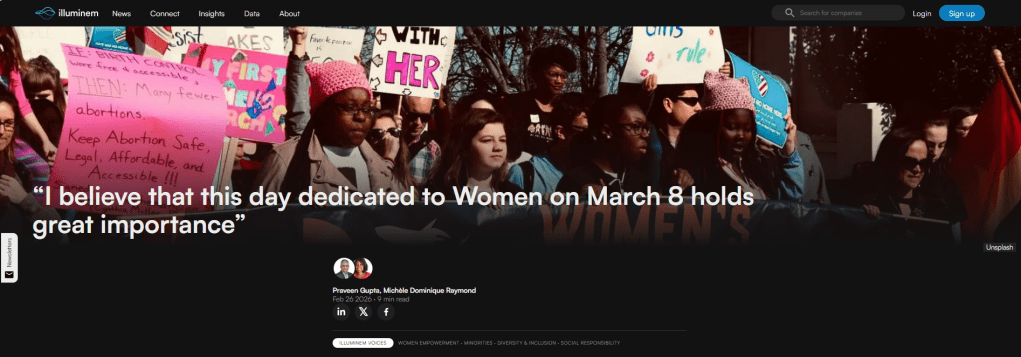
TOI Blogs
February 18, 2026
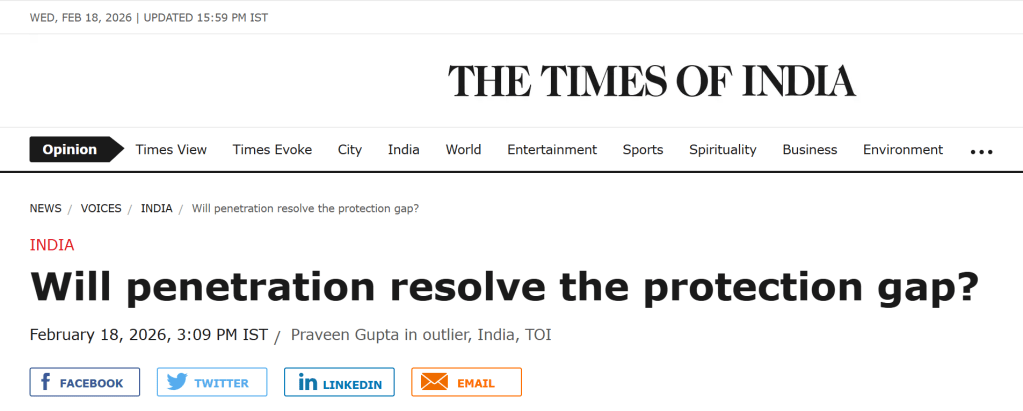

Please read the full blog here: https://timesofindia.indiatimes.com/blogs/will-penetration-resolve-the-protection-gap/

Juila Sitoe is a Marine Biologist based in Mozambique. Her work focuses on species identification and marine resource sustainability. She currently serves as Regional Coordinator for Minorities in Shark Sciences (MISS) in Africa, where she advocates for greater representation of African early-career professionals in ocean sciences.
Julia holds a degree in marine, aquatic, and coastal biology from Eduardo Mondlane University and has experience in research, scientific curation, mangrove conservation, and studies on ichthyoplankton & elasmobranchs. Julia is committed to advancing marine conservation through research, community education, and capacity building.
“A mother who understands the basics of marine biology contributes to raising a generation of children, adolescents, and young people with a clearer understanding of marine ecosystems, resource management, and the consequences of poor environmental practices“: Julia shares this nugget with me.
Praveen Gupta (PG): Why do you believe community education is very important as a first step towards desired change?
Julia Sitoe (JS): I believe that community education is a fundamental first step towards meaningful and lasting change. When a community is educated about environmental conservation whether marine or terrestrial the impact of any implemented project extends beyond its duration. Even after the project ends, the community continues the work because its members understand the importance of preserving their natural resources. They recognise that they are the primary beneficiaries of sustainable fisheries and terrestrial resource management.
PG: How is a women-focused ocean literacy programme key to introducing marine biology concepts to community members?
JS: I believe that a women-focused ocean literacy programme is key to introducing marine biology concepts to community members. In most Mozambican households, mothers are primarily responsible for their children’s education. A mother who understands the basics of marine biology contributes to raising a generation of children, adolescents, and young people with a clearer understanding of marine ecosystems, resource management, and the consequences of poor environmental practices. As a result, children and young people share this knowledge with friends, colleagues, and neighbours, multiplying its impact. There is a saying that “to educate a woman is to educate a nation,” and I strongly believe that women are central to fostering a more environmentally conscious generation.
PG: What are threats arising from the use of micro-nets and bottom trawling in your waters?
JS: Yes, the most recurrent threats associated with the use of micro-nets include the disruption of fisheries sustainability due to habitat destruction and the capture of juvenile species. The small mesh size makes these nets highly non-selective, leading to increased bycatch. This directly affects local communities by increasing the risk of a drastic decline in fish stocks.
“Illegal fishing poses a serious threat to food security and to the livelihoods of artisanal fishers, directly impacting coastal communities
We also face significant challenges related to bottom trawling and illegal fishing. One of the main obstacles in addressing these issues is the weakness of our monitoring and enforcement systems, which are insufficient to properly control and supervise foreign vessels that do not dock in national ports. Additionally, the growing demand for deep-sea shrimp has intensified bottom trawling activities. Due to limited coastal enforcement in Mozambique, unidentified industrial vessels can operate destructively, damaging marine habitats. Illegal fishing poses a serious threat to food security and to the livelihoods of artisanal fishers, directly impacting coastal communities.
PG: What was your role in shark science development and your work on advocacy for African early-career professionals and women?
JS: My involvement in shark research began through my affiliation with the North American organisation Minorities in Shark Science (MISS), which supports underrepresented groups in ocean sciences, with a focus on elasmobranch research. I participated in the Diversifying Ocean Science Fellowship, which focused on tropical ecology. During this programme, I gained hands-on experience in shark and ray conservation efforts in Miami’s Biscayne Bay aboard the research vessel Dr. Garvin.
I was trained in capture techniques and in the collection and processing of biological and morphometric data. This experience enabled me to develop a final project focused on the biodiversity of elasmobranchs, fish, and macroinvertebrates in Biscayne Bay.
Regarding advocacy, I volunteered as the Regional Representative for Africa within MISS. In this role, I work to raise awareness about opportunities available to minorities in the Global South, with the goal of increasing the representation of Black African professionals in ocean sciences.
PG: As an Outreach Officer at ‘Love the Oceans’, what was your mission and how did it go?
JS: As Outreach Officer at Love The Oceans, my primary mission was to raise awareness among private and international schools in Maputo about the marine conservation projects developed in Inhambane, Mozambique. The goal was to spark interest in participating in our school expeditions.
In terms of awareness-raising, the mission was successful. The school visits provided students with a more realistic understanding of how marine conservation initiatives are implemented in practice. However, participation in the school expeditions was limited due to the political instability in the country between mid-October 2024 and mid-2025, following demonstrations related to the general election results. During this period, school principals and administrators did not feel it was safe for students to travel to another province.
“Overfishing these species can lead to uncontrolled algal proliferation, ultimately damaging coral reef ecosystems
PG: As a member of the plankton lab team what was the collection of mesozooplankton samples about?
JS: During the multidisciplinary oceanographic cruise conducted in February 2025, the main objective was to assess the initial state of fishery resources in the Sofala Bank, with a particular focus on plankton communities. Mesozooplankton samples were collected to study their spatial distribution in the area. This information is essential for informing future fisheries management measures, especially considering that the Sofala Bank is the most important shrimp fishing area in Mozambique. Understanding the early-life stages of marine resources is therefore crucial for sustainable management.
PG: Any key learnings you would wish to share?
JS: During my time in Jangamo, where I monitored artisanal fisheries, the sustainability of fishing practices varied by location. At Guinjata Beach, fishing nets were predominantly used, while at Paindane Beach, line and hook methods were more common. This difference in gear strongly influenced the types of species caught.
At Guinjata Beach, many of the species caught were herbivorous fish, which play a crucial role in maintaining coral reef health by controlling algal growth. Overfishing these species can lead to uncontrolled algal proliferation, ultimately damaging coral reef ecosystems. To address this issue, Love The Oceans developed a sustainable fishing project that included providing kayaks to local fishers, preceded by extensive awareness-raising activities.
At Paindane Beach, fishing methods were generally less harmful to the marine environment, requiring less intensive awareness efforts.
Jangamo Bay is rich in marine biodiversity, including several species of sharks, rays, and dolphins. The dolphins observed in the bay often dispersed when they heard boat engines. They typically travelled in groups, sometimes consisting of a mother and calf, and in other cases groups of more than five individuals.
Humpback whales were commonly observed in Jangamo Bay between May and December. Frequently observed behaviours included breaching and tail slapping. Males competing for females and mothers accompanied by calves were also documented.
PG: Many thanks Julia for sharing these interesting insights. Best wishes for your endeavour in safeguarding our ocean biodiversity.
Blog interview also carried by illuminem: https://illuminem.com/illuminemvoices/to-educate-a-woman-is-to-educate-a-nation
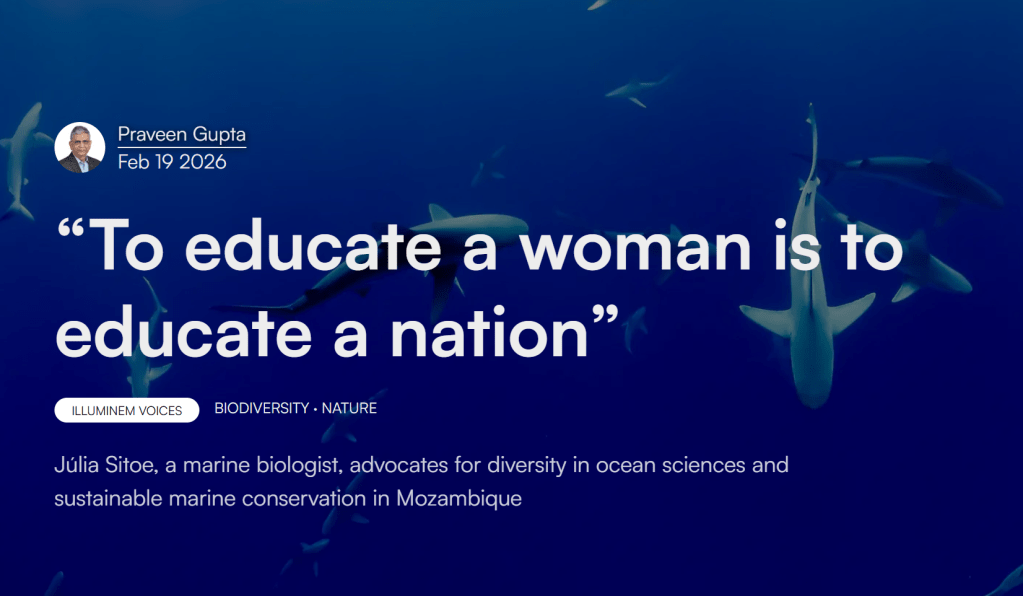
Sanctuary Asia
Feb-March 2026

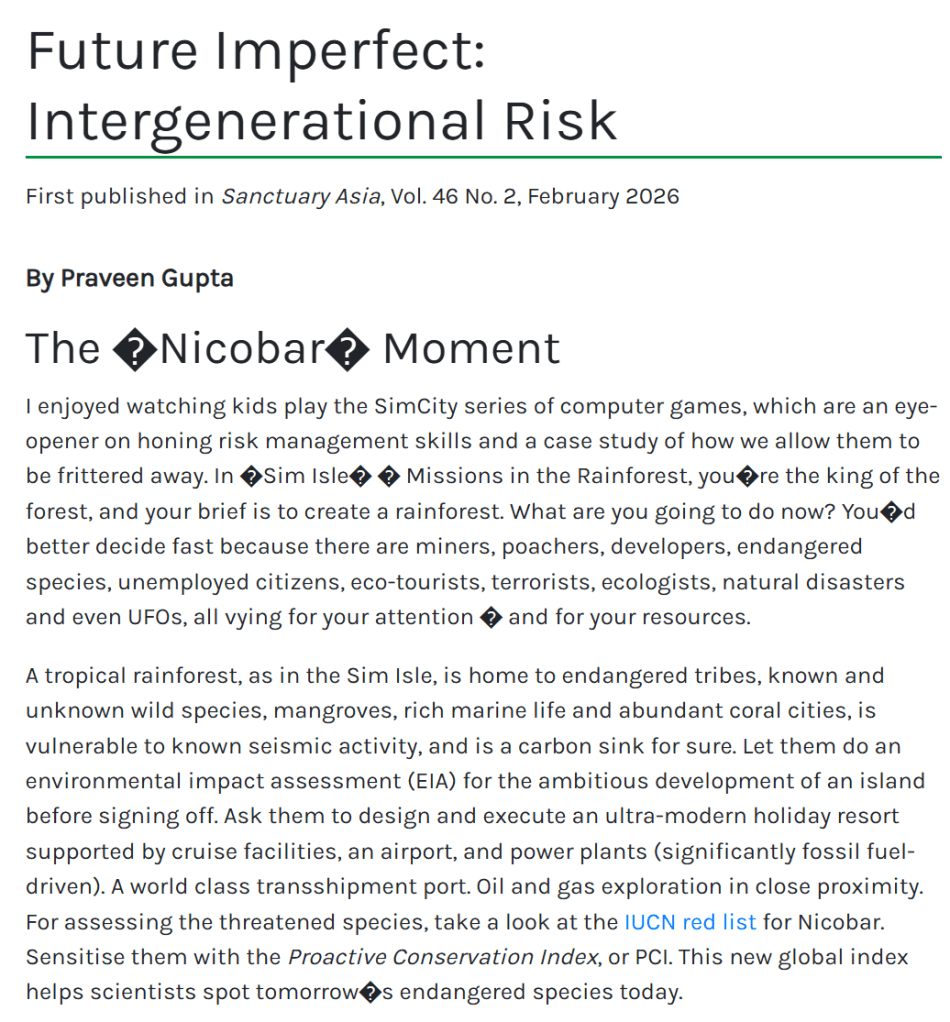
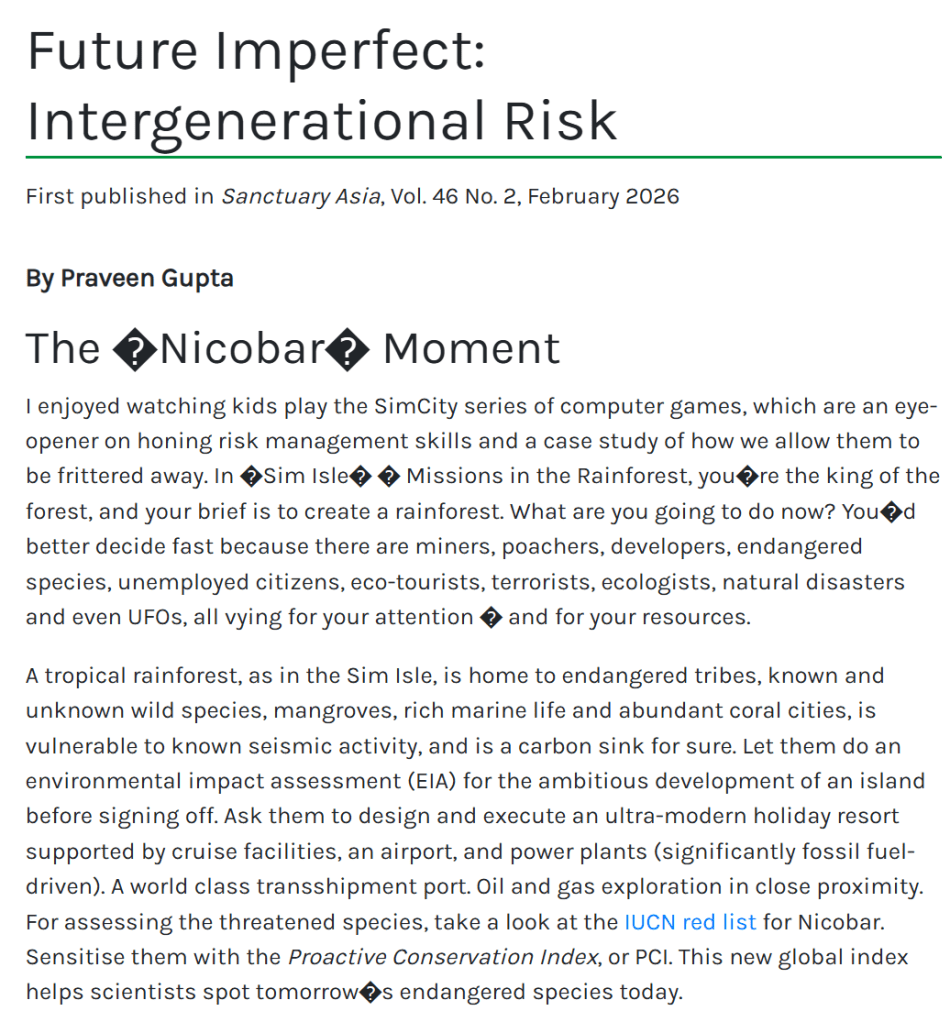

Please read on: https://sanctuarynaturefoundation.org/article/future-imperfect%3A-intergenerational-risk
Also subsequently carried by illuminem: https://illuminem.com/illuminemvoices/future-imperfect-intergenerational-risk

TOI blogs
January 22, 2026

LinkedIn post: https://www.linkedin.com/feed/update/urn:li:activity:7419958646102708224/
My Op-ed on TOI blogs: https://lnkd.in/d9dt8UYy.
I begin with a quote from Mark Carney‘s famous speech of 2015, long before his speech at the ongoing #WorldEconomicForum – #Davos – went viral!
With seven of the nine #planetaryboundaries breached, several #earthsystems are wobbly and likely to hit #tippingpoint. The once faraway manifestations – what Mr. Carney the former Bank of England Governor and the current Canadian PM alluded to as “a tragedy of the horizon” – have begun to unfold before us.
The renowned Dr. Johan Rockström warns: Many scientists, myself included, are increasingly worried that, by continuing to warm the planet, we are bringing multiple Earth system tipping points closer to being crossed.
The #AMOC, for instance, was expected to stall only by the turn of the next century. Such is the intensity and speed of what is unravelling that many #climatemodels are faltering.
“An actuarial review of key climate change assumptions shows we may have seriously underestimated the rate of warming as well as the related economic impacts”, says Sandy Trust of the Institute and Faculty of Actuaries (#IFoA).
The Parasol Lost report – from the IFoA and University of Exeter warns: “That without action, global warming is now likely to reach 2°C before 2050, a level associated with catastrophic impacts on societies and economies worldwide… This raises the risk of climate-driven #inflation, #financialshocks, and the withdrawal of insurance from high-risk areas much sooner than many expect…”
Other than risk carriers, #insurers (and #reinsurers) are also investors and risk managers. Do they have the luxury of business as usual? Who is better equipped than the actuaries to #steward the insurers away from “tragedy of the horizon”?
TOI Blogs
January 8, 2026

LinkedIn post: https://www.linkedin.com/feed/update/urn:li:activity:7414892488957575169/
In a recent piece (https://lnkd.in/dZrWQ8SR) I pointed out it was time to revisit vestiges of the yore. Notwithstanding opening up of the insurance biz, knock-for-knock agreement remains embedded in the system. But in this instance, in our rush to rid ‘price controls’ – we also threw away a semblance of risk management practices. That was 25 years ago.
Besieged by a rising frequency and severity of climate risk – just when a new #riskmanagement order ought to be in place – we believe #parametric is the mantra to chant. As a procedure it sounds good and may provide short-term liquidity.
However, substantively they do nothing to reduce underlying risk. Without steep cuts to #globalemissions, storms like Melissa – which recently devastated Jamaica – will intensify, eroding the viability of these financial products altogether. I quote Lisa Sachs, Director, Columbia Center on Sustainable Investment & Columbia Climate School.
Aren’t we barking up the wrong tree?
illuminem
December 24, 2025

illuminem link: https://illuminem.com/illuminemvoices/india-was-in-a-dire-economic-crisis
LinkedIn post: https://www.linkedin.com/feed/update/urn:li:activity:7409513517495541760/
TOI Blogs
December 16, 2025

Link to TOI blog: https://timesofindia.indiatimes.com/blogs/outlier/stop-the-risk-at-its-source/

Dr. Ashok Desai is an eminent economist, scholar, author and journalist. A PhD from University of Cambridge, he was the Chief Economic Advisor to the MInistry of Finance (1991- 93). He played a key role in designing and implementing a radical reform of economic governance, dismantling controls and restrictions that were 50 years old and had outlived their usefulness.
Praveen Gupta: If you were to revisit the Indian reforms agenda of 1991 – what is it that you would wish to do differently?
Ashok Desai: Nothing. India was in a dire economic crisis, what we had to do would have been clear to any economist, the crisis started some years before we came to power, the government had been running to Washington and borrowing from International Monetary Fund (IMF) and World Bank (WB), they set conditions for lending which the government did not fulfil – either because it did not have sufficient political support or because it had ideological objections – and what needed to be done was clear to any rational economist.
“When I entered the office of Chief Economic Advisor, the file on the top was the IMF file. IMF said very succinctly what needed to be done, I wrote that I agreed, and sent the file to the minister“
When I entered the office of Chief Economic Advisor, the file on the top was the IMF file. IMF said very succinctly what needed to be done, I wrote that I agreed, and sent the file to the minister. Later, I published my analysis of the crisis in my first Economic Survey 1991-92; you will find what I thought in the two volumes. The first volume A is fundamental and brief.
PG: The resultant trajectory was at the cost of environmental sustainability. Would you agree?
AD: No. If anyone says what you have and gives a rationale for it; I will refute it. India is the world’s leading superpower in solar power. It could improve its policy on global warming, but whatever it may do or not do will have only a minor impact on global warming. The biggest contributors to global warming over the past 150 years are the industrial countries.
“The answer is complicated, scores of scholarly books and hundreds of articles have been written about it… I will give a brief answer”
PG: What came in the way of India catching up with China?
AD: You presumably mean growth. The answer is complicated, scores of scholarly books and hundreds of articles have been written about it, and I can’t summarize them here. I will give a brief answer. China has done better for four reasons: First, it is a dictatorship: it does not have divisive democratic decision-makers. Second, it used its dictatorial state to save and invest twice India’s savings/GDP and investment/GDP ratio. Third, it did not follow international conventions; it copied and stole technology from all over the world. Finally, although it is a dictatorship, it does not control government authorities lower down. So they had to work out their own ways to grow. There was enormous innovation both in technology and governance at lower levels.
PG: What were the key findings from your thesis on post-war Germany? Can India leverage some of the learnings?
AD: My thesis was not on post-war Germany. It was about investment and income distribution in Germany before World War I. Here it is.
India can learn nothing from Germany before the First World War.
PG: Just like the Japanese economy, Germany too appears to be struggling with its legendary momentum. Does that concern you and if so why?
AD: Both are extremely rich; their people are living well, and will continue to do so even if they don’t do too well. Their problems are very different. Germany is trying to improve the performance of the European Union and manage its relations with Trumpian America; Japan has close economic relations with China and strategic relations with the US and is trying to balance China and USA.
PG: Grateful thanks for these excellent insights, Dr. Desai.
